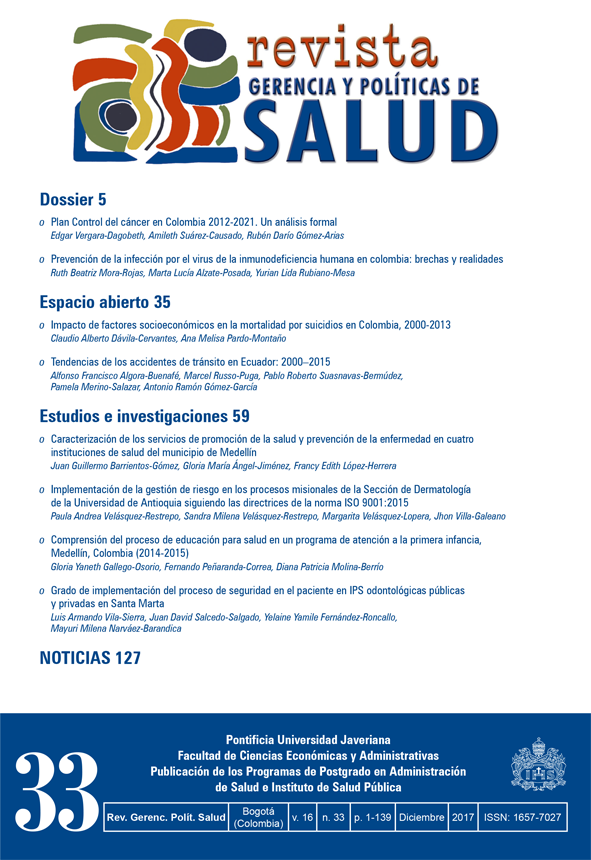Abstract
This article presents the understanding of the educational process of the ‘Buen Comienzo’ program, in the gestation and first year modality, as an input to expand upon the learning about education for health in general. This is part of the results of a qualitative research, under a hermeneutical approach and an ethnographic orientation. The field work was carried out through participant observation, semi-structured interviews, and the review of institutional documents. Results showed that, although the program seeks to privilege the exchange of experiences and recognize the knowledge and perceptions of families regarding the upbringing –in a dialogical relationship with the disciplinary knowledge of educational agents– educational practices privilege and legitimize scientific biomedical knowledge over the knowledge of significant adults. This came to show its cultural weight, materialized in strongly classified educational processes which are framed according to the proposal of Bernstein, which guided the analysis of the study.
2. Bastidas M, Acevedo A, Pérez FN, Torres JN. El diálogo de saberes como posición humana frente al otro: referente ontológico y pedagógico en la edu- cación para la salud. Invest Educ en Enferm. 2009 mar; 27(1):104-11.
3. Serrano MI. Educación para la salud y participación comunitaria. Madrid: Díaz de Santos; 1990.
4. Tones K. Reveille for radicals. The paramount purpose of health education? Health Educ Res
2002;17(1):1-5.
5. Whitehead D. Health promotion and health edu- cation: advancing the concepts. J Adv Nurs. 2004;
47(3):311-20.
6. Greene W, Simons Morton B. Educación para la salud. México: Interamericana- McGraw Hill; 1988.
7. Figueiredo MFS, Rodrigues-Neto JF, Leite MTS.Modelos aplicados às atividades de educação em saúde. Rev Bras Enferm, Brasília 2010 ene-feb;63(1):117-21.
8. Duarte J, Gallego T, Parra P. Análisis de progra- mas sobre la atención y el desarrollo a la primera infancia. Rev Latinoam Cienc Soc Niñez Juv.2011;9(2):105-43.
9. Díaz PA. Concepciones teóricas sobre la teoría en educación para la salud: revisión sistemática. Invest Educ Enferm. 2012; 30(3):1-12
10. Salci MA, Maceno P, Rozza SG, Silva DMGV, Boehs AE, Heidemann ITSB. Health education and its the- oretical perspectives: a few reflections. Text Context Nursing. 2013 ene-mar; 22(1):224-230.
11. Colombia. Secretaría de Educación de Medellín.Resolución 12760 de 2012 por medio de la cual se regula la prestación del servicio de atención integral a la primera infancia en el desarrollo del programa Buen Comienzo. Medellín: La Secretaría; 2012.
12. Arango C. Diseño e implementación de un sistema de evaluación del programa Buen Comienzo, Me- dellín 2013-2014 [Tesis de grado para optar al título de doctor en epidemiología]. Medellín: Facultad Nacional de Salud Pública; 2013.
13. Bourdieu P, Passeron JC. La reproducción: ele- mentos para una teoría del sistema de enseñanza. México: Fontamara; 1998.
14. Bernstein B. La estructura del discurso pedagógico.Madrid: Morata; 2001.
15. Ríos T. La hermenéutica reflexiva en la investiga- ción educacional. Revista Enfoques Educacionales.
2005;7(1):51-66.
16. Herrera JD. La compresión de lo social: horizonte hermenéutico de las ciencias sociales, segunda edición. Bogotá: Cinde; 2010.
17. Geertz C. La interpretación de las culturas. Barce- lona: Gedisa; 2005.
18. Stake R. Case Studies. En: Denzin N, Lincoln Y, compiladores. Handbook of qualitative research, segunda edición. Thousand Oaks, California: Sage Publications, 2000:235-454.
19. Coffey A, Atkinson P. Encontrar sentido a los datos cua- litativos. Estrategias complementarias de investigación. Medellín: Editorial Universidad de Antioquia; 2003.
20. Muñoz LA, Sánchez X, Arcos E, Vollrath A, Bonatti C. Vivenciando la maternidad en contextos de vul- nerabilidad social: un enfoque comprensivo de la fenomenología social. Rev Latino-Am Enfermagem [Internet]. 2013;21(4): [7pantallas] [acceso: 14 de fe- brero del 2016]. Disponible en: www.eerp.usp.br/rlae
21. Merighi M, Rodrigues R. Domingos S. Care needs of pregnant women with a private health insurance: a comprehensive social phenomenology approach. Rev Latino -Am Enfermagem. 2007 sept-dic;15(5):914-21.
22. Freire P. Pedagogía del oprimido. México: SigloXXI; 1975.
23. Santillan L. Escuela, nuevas configuraciones familiares y cambio sociocultural. En: Argentina, Ministerio de Educación, Ciencia y Tecnología de la Nación, Dirección Nacional de Gestión Curricular y Formación Docente Área de Desarrollo Profesional Docente. Cine y Formación Docente 2006. Ciudad de Neuquén; 2006.
24. Not L. La pedagogía del conocimiento. Bogotá: Fondo de Cultura Económica; 2000.
25. Foucault M. Historia de la medicalización. Educ Med Salud. 1977;11(1):3-25.
26. Lolas M. Camino para un eficaz encuentro inter- personal. Rev EE. 1998;1(1):121-26.
27. Berger P, Luckmann T. La construcción social de la realidad. Buenos Aires: Amorrortu; 1968.
28. Granda E. La salud y la vida: Perspectivas de la salud pública para el siglo XXI, volumen 1. Ecuador: OPS; 2009.
Copyright notice
The Journal Management and Health Policies is registered under the Creative Commons Recognition 4.0 International license. Therefore, this work can be reproduced, distributed and publicly communicated in digital format, provided that the name of the authors and the Pontificia Universidad Javeriana are recognized. It is allowed to quote, adapt, transform, autoarchive, republish and create from the material, for any purpose (including commercial), provided that authorship is properly acknowledged, a link to the original work is provided and if changes have been mad. The Pontificia Universidad Javeriana does not retain the rights over published works and the contents are the exclusive responsibility of the authors, who preserve their moral, intellectual, privacy and publicity rights.
The endorsement of the intervention of the work (revision, style correction, translation, layout) and its subsequent disclosure is granted through a license to use and not through a transfer of rights, which means that the journal and the Pontificia Universidad Javeriana disclaims any liability that may arise from ethical misconduct on the part of the authors. As a result of the protection provided by the license for use, the journal is not obliged to publish retractions or modify the information already published, unless the erratum arises from the process of editorial management. The publication of contents in this magazine does not represent royalties for taxpayers.


